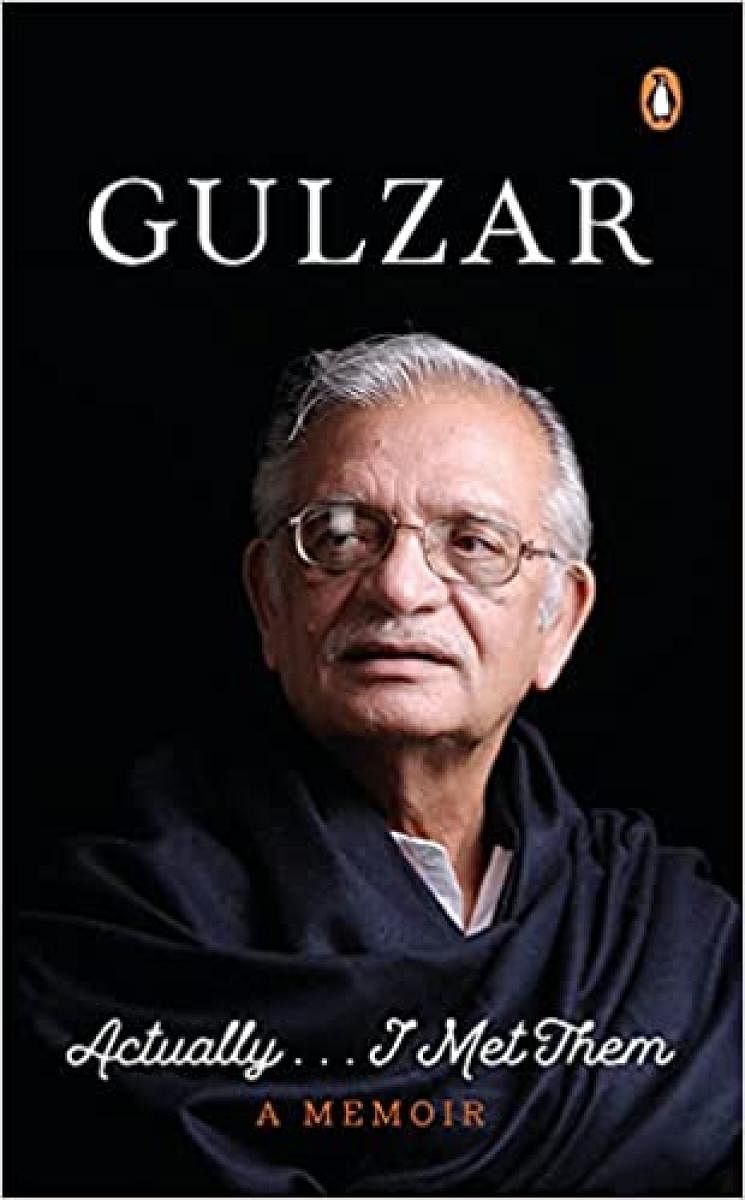
Gulzar’s love for Bengali is unquestionable. “I cannot say for sure if it was the Bengali language that possessed me or I was the one possessed by it,” he writes in the first chapter of his memoir ‘Actually...I met them’.
The Bengali school of thought in Hindi cinema is due to the glorious story of migration in the 1950s. The decline of mainstream Bengali cinema coincided with Bimal Roy — one of the top talents from Calcutta — shifting base to Bombay. Gradually, ‘The City of Dreams’ became home to greats like Salil Chowdhury, Hemanth Mukhopadhyay, Hrishikesh Mukherjee, Basu Bhattacharya, and more. Gulzar talks about these and many other stalwarts who inspired him to be the legendary wordsmith he is today.
This book, a collection of his columns in a Bengali newspaper, was first published in Bengali as Panta Bhate. It has now been translated into English by Mahargya Chakroborty.
It’s impressive that regardless of Gulzar’s impeccable success, the veteran Hindi and Urdu poet and lyricist chooses to stay away from any sort of self-praise in the memoir. His tone is consistently modest and nostalgic while describing his days with his ‘gurus’. The writing comes superbly alive as he digs deep into the person behind the persona of each of the 18 artistes mentioned in the book.
Chatty and eloquent
He looked up to Bimal Roy, a realistic cinema giant (Do Bigha Zamin, Parineeta, Biraj Bahu, Devdas) with awe and respect. He describes the filmmaker as a workaholic. “Bimalda was always busy, working even after double shifts. For him, living life meant living the movies,” he writes.
He observed Roy’s greatness like a child. “When Bimalda passed away, I rushed to his house and then to the crematorium. With a bang, I cried and cried and then cried. All the pain that I had stowed away for my father seemed to find closure,” says the writer, who, until then, suffered from the pain of missing his father’s funeral.
The chapters on Suchitra Sen and Sharmila Tagore have eloquent writing. The former was called the reclusive star yet Gulzar knew the actor differently. His friendship with Sen, developed during his controversial directorial venture, Aandhi, remained undamaged.
“I had heard so much about how she was very reserved, how she never socialised with people or even spoke to them. But that did not mean she had stopped interacting with people. I used to go see her whenever I visited Calcutta. She was an extremely emotional and warm person. Not for once did she use glycerine while doing the emotional scenes in Aandhi. She cried naturally,” he recalls.
Not many can blend glamour with grace like Tagore. The veteran actor is an intellectual too, points out Gulzar. “Had I not met her, I would have perhaps not known that such a graceful personality and a razor-sharp intellect could cohabit,” he says.
The best chapters are on actor Sanjeev Kumar and composer R D Burman, two all-time greats. Sanjeev’s acting had a thuggish approach that helped him effortlessly hold his own opposite a superstar like Dilip Kumar in Sangharsh. Admitting that he was a great person and a wonderful actor with an incomparable sense of humour, Gulzar reveals Sanjeev’s character flaw. “He had no regard for the concept of punctuality.”
“How can you make films without me?” the versatile actor always asked Gulzar.
The unbreakable friendship produced classics like Mausam, Aandhi, and Namkeen. For Gulzar, Sanjeev was a huge part of his life.
His bond with R D Burman was magical. Did you know that some of the greatest songs from the duo emerged out of their late-night car drives?
The ever-melodious Musafir hoon yaaron from Parichay and Duniya mein logon ko from Don were created on the road, with street lights adding a glow to their shining talents.
Hrishikesh Mukherjee was a terrific editor with an addiction to chess. Gulzar found him to be a master in turning adversity into advantage. “How to shrink one’s budget from small to smaller was something one had to learn from Hrishida,” he says of the man who championed ‘middle cinema’ of India (Anand, Guddi, Gol Maal).
He rues not working with the world-class auteur Satyajit Ray after coming close twice. He defines Ritwik Ghatak as a melodramatic person. “That’s the way he knew how to live and create art. He was unique,” writes the veteran filmmaker.
All the anecdotes in this book are filled with warmth and subtle humour. The Dadasaheb Phalke and Oscar winner does well by focusing on the simpler aspects of the lives of these revered artistes.
Get immersed in this book with a cup of chai on a breezy evening and go back in time to know how a bunch of talents shaped one of the golden eras of Hindi cinema.